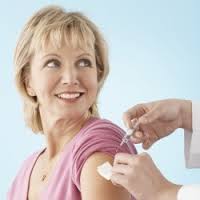Vaccines are not just for kids.
 Many people have feared Ebola since last September, when it spread beyond West Africa. It was the worst Ebola outbreak on record. But in the US, there is something that should cause more fear: the influenza virus, otherwise known as the flu.
Many people have feared Ebola since last September, when it spread beyond West Africa. It was the worst Ebola outbreak on record. But in the US, there is something that should cause more fear: the influenza virus, otherwise known as the flu.The National Institutes of Health estimate that annually more than 200,000 people are hospitalized and 36,000 die because of flu in the US. But there is good news. Flu can almost always be prevented, or at least the symptoms reduced, by getting a flu shot.
There are times, such as this year, when the influenza virus mutates and ends up not being a good fit for the vaccine. The Centers for Disease Control and Prevention report that flu shots may still offer some protection against these viruses, which could help reduce the risk of the most severe complications from the flu. Click here for more information on the flu vaccine.
In addition to an annual flu shot, there are other recommended vaccines for adults who are 50 and older:
- A tetanus-diphtheria vaccine (Td), which is given to adults as a booster shot every 10 years
- Tdap, which is similar to Td, but also protects against pertussis (whooping cough). Tdap is given as a one-time booster in place of Td and is especially important for adults in close contact with infants.
- Shots to prevent shingles for adults age 60 and older. Even if you have had shingles, the shingles vaccine can help prevent additional occurrences of the disease. Learn more about shingles prevention.
- A pneumococcal vaccine to help protect against pneumonia in adults age 65 and older. Learn more at Vaccines.gov.
Adults should talk with their physician about whether to get other vaccinations. Any travel planned outside of the US might require additional vaccinations. Please see this chart listing recommended vaccinations for adults: 2014 Recommended Immunizations for Adults by Age.
Some people fear vaccines because they worry about getting the disease after receiving the shot. Vaccines do contain the same germs that cause that specific disease. For example, the measles vaccine contains measles virus, but the germs have been either killed or weakened to the point that they do not make people sick.
After receiving a vaccine, a person’s immune system is stimulated to produce antibodies, exactly like it would if it was exposed to the disease. This does not cause illness, but causes the immune system to develop the same response as it does to a real viral or bacterial infection, so that the body can recognize and fight the disease in the future. Sometimes, vaccines can cause minor symptoms, such as fever. This and possibly other minor symptoms are normal and should be expected as the body builds immunity.
Get vaccinated. Vaccination reduces the risk of infectious disease, and its complications, not only for an individual, but for the community as well.






Leave A Comment
You must be logged in to post a comment.